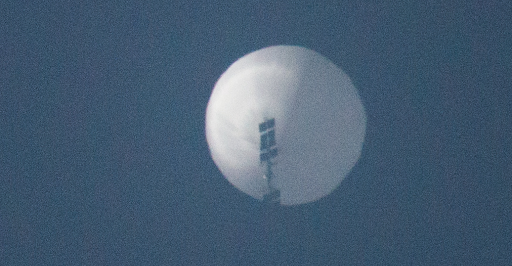The U.S. Air Force shot down what was identified as a Chinese surveillance device off the coast of South Carolina Feb. 4.
The device, referred to as the “Chinese spy balloon,” traversed the U.S. and Canada for more than seven days before President Joe Biden ordered it to be shot down by an F-22 fighter jet over the Atlantic Ocean.
In the aftermath of the device being shot down, the U.S. Navy was in a frenzy attempting to salvage as much of the debris as possible for further analysis.
Before the balloon accomplished its U.S. tour, it made its way over the Malmstrom Air Force Base in Montana, the Offutt Air Force base in Omaha and the Whiteman Air Force Base in Missouri — all highly sensitive U.S. strategic command bases and nuclear missile sites.
While little is known about what specific information the device has gathered, the impact of this incident on U.S.-China relations is widespread.
From the moment the balloon entered United States airspace over the Aleutian Islands, China violated Article Two of the United Nations Charter, which enforces the idea of individual state discretion within its borders.
As stated by the White House, the incident was a “clear violation of our sovereignty as well as international law.”
However, the Chinese Foreign Ministry is making the same claims.
“In these circumstances, for the United States to insist on using armed force is clearly an excessive reaction that seriously violates international convention. China will resolutely defend the legitimate rights and interests of the enterprise involved, and retain the right to respond further,” a Chinese Foreign Ministry spokesperson said.
The U.N. “Chicago Convention” also establishes international rules for airspace and air traffic.
The U.S. and China are bound by the “Chicago Convention” considering every member state of the U.N. has ratified it. The convention highlights several key aspects, all coincidentally highlighted in China’s statement to the U.S. shooting the “civilian aircraft” down.
First, the convention prohibits foreign aircrafts from entering another state unless it’s a balloon used for meteorological purposes. This may be why China claims this was a weather device.
Additionally, use of force against a civilian aircraft can be viewed as an act of violence against the country involved. Hence, China has publicly declared this as an act of war and claims the U.S. violated international standards through use of “excessive force.”
International law is clear over the use of foreign aircrafts over airspace. China is clearly and strategically relying on the “Chicago Convention” to justify their actions.
China is infamous for its espionage operations, as there are over 160 publicly reported instances of Chinese espionage in the U.S.
In the event of a potential escalation, Florida’s military bases have the possibility of being engaged considering the state houses some of the largest bases in the country from Naval Station Mayport in Jacksonville to MacDill Air Force Base in Tampa.
The spy balloon incident represents a physical manifestation of the escalation in tensions of U.S. and China relations over the last four years. Most of the data collected by the spycraft is not believed to be significantly more valuable than what is already collected from the U.S. via satellite.
Nevertheless, China took active measures to alarm the American population and reveal potential weaknesses in homeland security to the international stage.
The premise of the story has raised concerns, as a prevailing perspective may be that the American government allowed a foreign aircraft to traverse highly sensitive territory crucial to national security. This may serve as a tangible reminder to the U.S. population of the growing threat posed by the People’s Republic of China.
The perception of a brazen act such as this can warrant immediate action on the government’s end. However, waiting until it reached the ocean, the Chinese government is regarded as completing its mission to gather whatever data it intended to collect.
The American government’s reaction may allow China to gain even more leverage over the U.S. as it appeared to fail a simple test of military readiness and government competence.
China asserting its presence on the global mainstage is likely just beginning. We are now seeing similar spycraft devices flown across other nations.
The manner in which China’s adversarial acts are dealt with can determine the future of global relations and how concerned the U.S. should remain over the growing threat.
This test is likely far from over.
Check out other recent articles from the Florida Political Review here.
Featured image: Chinese spy balloon flying over Billings, Montana. (Unmodified photo by Chase Doak used under a Creative Commons License. http://bit.ly/3YVp1P1)





